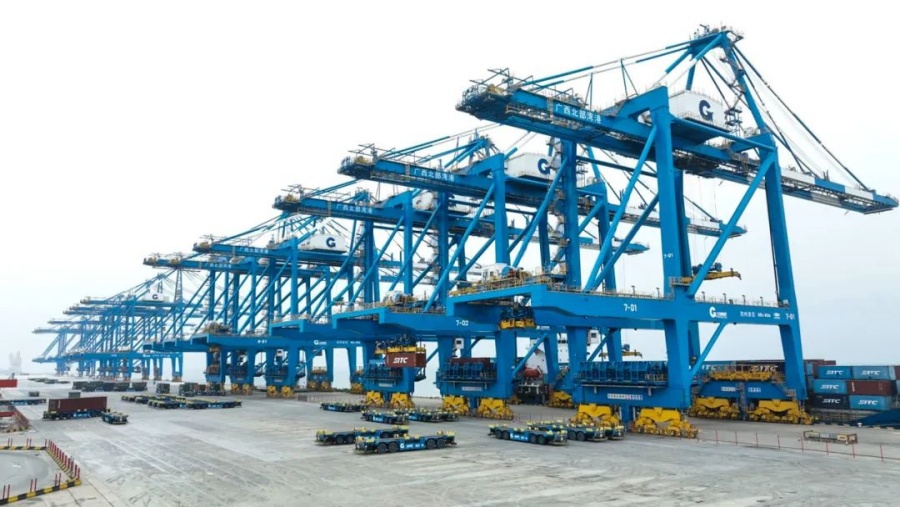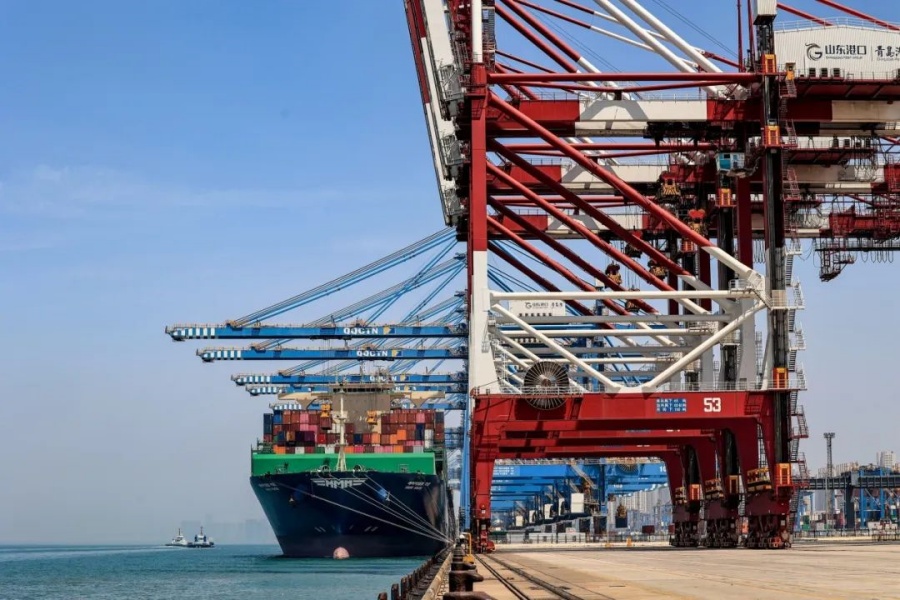China ranks first globally in number of intelligent ports

Photo shows an automated container terminal of Qinzhou Port in Qinzhou, south China's Guangxi Zhuang Autonomous Region. [Xinhua/Zhang Ailin]
China has built 52 automated container terminals and dry bulk terminals so far, with the numbers of automated terminals both built and under construction ranking first in the world, according to data from the country's Ministry of Transport.
Around 9 a.m. on Jan. 1, a vessel docked at a fully automated container terminal of Qingdao Port in east China's Shandong Province. After that, multiple bridge cranes loaded containers onto automated guided vehicles. Nearby, high-speed rail-mounted gantry cranes precisely stacked incoming containers in an orderly manner.
Such seamless loading and unloading operations are inseparable from automation. "The fully automated container terminal project, divided into three phases, began in 2015, with the third phase becoming operational by the end of 2023," said a manager of Qingdao Port.
Compared to the past, the terminal's operational efficiency increased by 6 percent, and its container throughput surged by 15 percent, the manager added. As the last container was loaded onto the vessel, the operational efficiency of a single bridge crane at the terminal reached 60.9 container units per hour on average, breaking the world record for the handling efficiency of automated container terminals for the 12th time.
At the ore terminal of Yantai Port in Yantai, Shandong, full process automation has been realized. Compared to traditional methods, both the overall unloading efficiency and the comprehensive loading efficiency of bulk cargo have improved by over 20 percent.
These two ports in Shandong serve as vivid examples of China's endeavors to expedite the development of intelligent ports. Focusing on automated terminals, China has accelerated the construction of intelligent ports in recent years, expanding and extending the scope for applying intelligent technologies, said an official with the Ministry of Transport.

Photo shows cranes loading containers onto a container vessel at an automated terminal of Qingdao Port in east China's Shandong Province. [Photo/Han Jiajun]
China's ports now lead the world in the level and application of automation technologies. In addition, the country has formulated technical standards for automated container terminals and automated coal and ore terminals, driving the development of intelligent ports. Some automated container terminal construction technologies have been implemented in ports of other countries.
China will improve the top-level design and the standard system for intelligent ports, develop an evaluation system for intelligent ports, promote the intelligent transformation of traditional terminals, and continue to make port services more intelligent at an accelerated pace to enhance infrastructure and development resilience of ports, said the official with the Ministry of Transport.
So far, China has mastered the key technologies in the design, construction, equipment manufacturing, system integration, and operational management of automated terminals.
From January to November 2024, China's ports handled 16.04 billion tonnes of cargo, up about 3.4 percent year on year, and processed 300 million twenty-foot equivalent units of containers, a 7.3 percent year-on-year increase.
"In recent years, ports across China have vigorously promoted the intelligent transformation of terminals, further improving operational efficiency and service capabilities," the official with the Ministry of Transport said.
The official added that China has so far built world-class port clusters in the Bohai Rim, the Yangtze River Delta, and the Guangdong-Hong Kong-Macao Greater Bay Area.
























